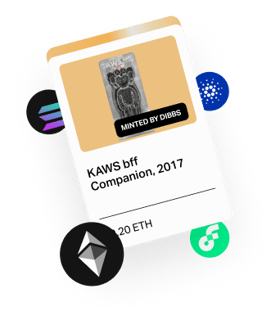What NFT Perks Should Your Brand Offer?

NFTs benefit brands by opening up new revenue streams and access to communities. Learn how brands are leveraging NFT perks to add value for users.
Loyalty programs are the cornerstone of brand-consumer relationships. Evolving over the years from simple stamp cards to sophisticated digital rewards, they have been an integral part of customer retention and engagement.
As per LendingTree Survey 2022, around 8 out of 10 Americans are part of at least one loyalty program.
But, with the variety of products and offers available in the market, it's challenging to capture and retain customer attention. Conventional reward strategies lack differentiation, true ownership, and transferability, making it even harder for brands to stand out.
Today, non-fungible tokens (NFTs) have come up promising a deeper connection with consumers. Their digital permanence, real-time traceability, and the ability to trade them easily make them an excellent tool for loyalty programs. And brands can use them for community building.
Talking numbers, in 2022 alone, NFT tokens generated sales of over $24.7 billion. Several mega brands like Adidas, Nike, and Gucci are partaking in the NFT market by releasing their NFT collections with perks attached for the users.
Now, the question:
Should your brand invest in NFTs? If yes, what kind of perks should you be offering?
This article will explore ways that brands are using NFTs and perks that they can offer along with their NFTs.
Subscribe to get our best content in your inbox
By clicking “Submit” you agree to Dibbs
Privacy Policy and
consent to Dibbs using your contact data for newsletter purposes.

What Benefits Could NFTs Bring to Your Brand?
NFTs, standing for non-fungible tokens, represent unique digital assets that can't be interchanged on a one-to-one basis. This is because, unlike a cryptocurrency like Bitcoin where each of the 21 million coins are identical, each NFT has a distinct digital identifier making it one-of-a-kind and inherently valuable.
Brands can leverage the uniqueness and rarity of NFTs to add to the perceived value of their products. This can be in the form of exclusive and limited-edition items. By minting NFTs linked to physical products, brands enable a new way to engage customers.
We've listed some of the NFT benefits for brands:
Brand Loyalty
Brands can launch limited edition products with exclusive NFT perks. By offering such exclusivity, brands can foster deeper customer loyalty. They can also create personalized loyalty programs to offer more tailored rewards and experiences.
These create a long-lasting effect on the users while making their next related purchase decision.
Community Building
NFTs are known for fostering closely-knit communities like the Bored Ape Yacht Club (BAYC) and CryptoPunks. Brands can harness this by not just launching NFTs but also maintaining engagement through regular drops, virtual events, or even NFT-specific partnerships.
These communities foster a sense of belonging, shared values, and interests. Brands can utilize NFT collections to create a strong and engaged community and monetize them while providing unique offers and services.
Boost Brand Awareness:
Embracing NFTs enables brands to connect with a fresh, tech-savvy audience: crypto enthusiasts, Millennials, and Gen Z. A brand's unique story and its cohesive integration with traditional marketing campaigns can set it apart, ensuring it stays ahead of competitors and remains top-of-mind.
5 Ways Retail Brands are Using NFT Perks (With Examples)
NFTs have diverse applications across multiple industries —acting as digital certificates to confirm authenticity or serving as tokens for special event access.
Let's dive deeper into some ways brands can leverage digital collectibles to engage and serve their customers better:
Media & Journalism
Media organizations publish featured articles, in-depth research papers, and premium editorial columns. They can turn them into NFTs like Mirror and allow the readers to mint them. This allows the publications or the authors to monetize their content while preserving content authenticity.
On top of the NFTs, there is a plethora of perks that a media or journalism brand can offer to its audience.
They can offer exclusive perks to NFT holders, such as 'Ask Me Anything (AMA)' sessions with authors, and author-signed copies. There are other possibilities such as perks like unpublished behind-the-scene photos, or even personalized messages from authors, or workshops by journalists.
For example, Cointelegraph crypto media company launched the Historical NFT collection series, allowing readers to mint NFTs of the articles published.
Gaming
In Gaming, brands can issue NFTs to tokenize in-game assets like skins, maps, modes, avatars, armor, etc. They can offer perks on top of these gaming NFTs, such as free merchandise, voting rights, early access to game releases, abilities, and more.
Retail brands can collaborate with gaming and metaverse companies to create limited edition NFTs bundled with physical merchandise. These NFTs could include perks such as character items, attributes, or themes that extend the ownership into both the virtual and real world.
For example, Axie Infinity is an Ethereum-based gaming platform where players need to collect unique NFT digital pets- Axies. These NFTs are used to participate in battles, breed with other Axies, and are tradable at NFT Marketplaces.
SaaS
Brands can issue NFTs to replace current IP licensing for products and services that will help users prove ownership of the software license and keep track of transaction history.
SaaS Brands can also integrate Tiered NFTs for subscription plans to token-gate access to premium features. This will offer NFT holders an accurate pay-per-use model and access to upgrades or features based on NFT ownership.
For example, Salesforce, a customer relationship management platform, has released an NFT management tool to help brands build and integrate NFTs into their businesses.
Hospitality
NFTs provide massive opportunities for hospitality brands to streamline the management process and take their customer experience a notch higher.
Brands can use these digital assets to tokenize membership to chain restaurants or hotels. They can offer NFT perks like exclusive access or discounts to events, concerts, free reservations, or upgrades. Hotels can issue NFTs that enable tailored experiences for holders, such as custom room setup, itineraries, tours, and other services.
For example, Starbucks has launched Starbucks Odyssey, an NFT-based loyalty and experience program. It provides token holders with unique opportunities, such as access to espresso martini-making classes, events, and trips to Starbucks coffee farm in Costa Rica.
Education
Edtech brands can create NFTs for tokenizing educational resources and issuing digital identity cards and certificates of degree completion. This can help simplify the issuance process of certificates and reduce forgery and paper record risk.
They can use NFT badges to grant activity-based scholarships and concessions, provide access to digital libraries and paid courses, etc. Alongside, perks like access to seminars or workshops of experts and industry professionals can be an added bonus.
For example, LearnWeb3, Alchemy University, and Binance Academy issue NFT-based certificates to learners upon completion of the course.
Adopting NFT Perks in Your Brand Monetization
Overall, adding NFT perks into goods and services can help your brand create lifetime monetizable value and new opportunities to engage with customers.
You don't need to create NFTs from scratch, as Dibbs can help you integrate NFT collectibles into your business. To learn how we can help you enter the NFT space, schedule a demo with us, and unlock unique experiences for your customers.

Evan Vandenberg
Evan Vandenberg is the Co-Founder and CEO at Dibbs. Evan has been working in the NFT space full-time since 2018 and collecting since 1995.

